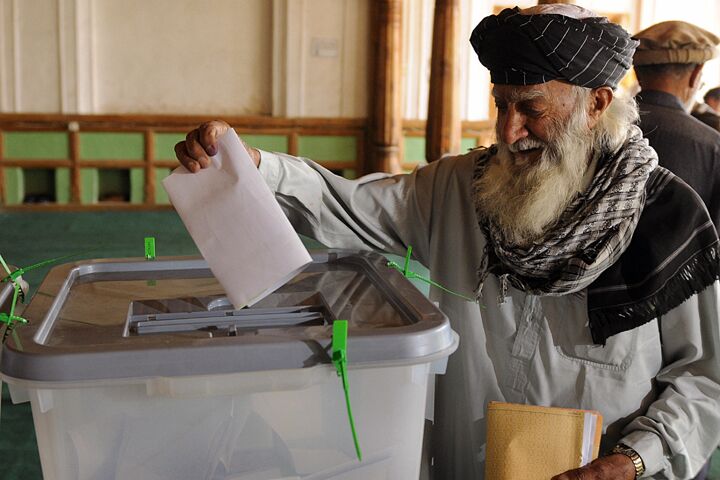
Democracy in Afghanistan
Presidential elections were held in Afghanistan last Thursday, the second such vote since the fall of the Taliban in 2001. Though official preliminary results are not due for about another two weeks, pre-election polls indicated incumbent Hamid Karzai would likely win another term, but not by enough to avoid a run-off election, which would be held October 1. Both President Karzai and his chief opponent, Abdullah Abdullah, have claimed victory, with Abdullah making allegations of election fraud. Instability resulting from the electoral process may result in substantial complications for the United States in its war against the Taliban.
It appears voter turnout was low for fear of violence. “The early information is that the turnout was very low in some provinces and at best was fair in others,” said Haroun Mir, director of Afghanistan’s Center for Research & Policy Studies. The Taliban carried out 73 attacks throughout the country on election day, according to Karzai. News organizations reported that 20 to 30 people were killed in the attacks.
Still, both U.S. President Barack Obama and President Karzai hailed the election as a success. “The successful conduct of elections” is “a propitious sign for establishing a democratically elected government and promoting democracy in the country,” the Afghan president told reporters after the polls closed.
But just how strong is democracy in Afghanistan?
According to Stratfor, Karzai owes his strength largely to his ability to make deals with warlords throughout the country, which he has done over the past seven years. “His co-opting of top Tajik, Hazara and Uzbek warlords Muhammad Qasim Fahim, Karim Khalili and Abdul Rashid Dostum likely will allow him to secure reelection” (August 20).
Hence, while the U.S. and its nato allies successfully ousted the Taliban from politics eight years ago, ironically Western efforts have not moved Afghan politics closer to democratic standards. “What we have here is a clear indication that the underlying geopolitical nature of Afghanistan has not been altered by attempts to steer the country toward democratic politics,” explains Stratfor. “Political parties have not supplanted ethnic- and tribal-based warlordism. On the contrary, warlordism determines electoral outcomes” (ibid.).
Last week’s election will not change the fundamental reality on the ground that the U.S. is dealing with: a resurgent Taliban. In fact, it could well make it worse, especially if Abdullah doesn’t accept the election results, which would further destabilize Kabul. “Ironically,” writes Stratfor, “attempts to impose a democratic political system in Afghanistan appear to be undermining the U.S. counterinsurgency strategy. … [T]he process of democratization has undermined the existing system precisely as it faces a massive threat from the Pashtun jihadist insurgency” (August 21).
Washington has indicated that ultimately it will seek a political settlement to quell the Taliban insurgency as it fails to make progress militarily. And any such political settlement would not involve democratic principles either. “Given the objectives of the Taliban, any political settlement would not come in the form of a democratic framework, and especially not Western-style democracy. Ironically, it is the politics of warlordism that could provide a framework for calming down the insurgency” (op. cit.). The only way the U.S. will get elements of the Taliban to lay down their arms, says Stratfor, would be to cut deals “with various Taliban commanders who would be willing to lay down arms in exchange for recognition of their domains of power.”
While the U.S. originally went into Afghanistan for strategic purposes, the idea—or hope—has been that spreading democracy to hostile countries would result in the establishment of peaceful, Western-leaning governments. Time and again, that philosophy has been proven wrong. Now, in Afghanistan, we have a president who, should he succeed in staying in power, will largely have supportive regional warlord strongmen to thank, with whom he has wheeled and dealed; and the prospect of Taliban strongmen being given legitimate rule over regions they already control by force. Meanwhile, the elections threaten to further destabilize the country.
Democracy really is not working in Afghanistan.
Back in 2002, speaking of democracy, we wrote: “The problem is that this effort to spread the gospel of democracy is predicated on one erroneous assumption—that all peoples think and act like Americans. They don’t!”
For Afghanistan, a country mired in corruption, insurgency and tribal politics, democracy is not solving its problems. For more on the fundamental problem of democracy and what the only true alternative is, read “Democracy on Trial.”
